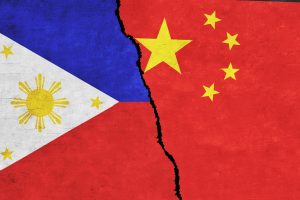The Philippines has no plans to use water cannons or offensive weapons in its ongoing stand-off with China in disputed parts of the South China Sea, President Ferdinand Marcos Jr. said yesterday.
Speaking to reporters on the sidelines of an event in Pasay City, Marcos expressed concern that such moves would only worsen the situation after months of growing friction. “We will not follow the Chinese Coast Guard and the Chinese vessels down that road because it is not the mission of Navy, our Coast Guard to start, or to increase tensions,” Marcos told reporters, according to the Philippine Information Agency.
“Their mission is precisely the opposite, it’s to lower tensions,” he added.
The past year has seen a string of confrontations between Philippine and Chinese vessels in contested parts of the South China Sea, particularly at Scarborough Shoal and at Second Thomas Shoal in the Spratly Islands, where the Philippines maintains an outpost aboard the BRP Sierra Madre, a grounded warship.
During many of these incidents, the China Coast Guard has fired water cannons at Philippine vessels that it claims are trespassing in Chinese waters. The latest confrontation took place on April 30 in the vicinity of Scarborough Shoal, in which Chinese water cannons caused significant damage to a PCG vessel and fisheries patrol boat, behavior that Manila’s National Task Force for the West Philippine Sea described as “illegal and irresponsible.” A PCG spokesperson later accused the CCG of increasing the pressure of its water cannons, to the point where they functioned as quasi-offensive weapons.
Water cannons have also been used in several recent confrontations near Second Thomas Shoal, as CCG vessels have attempted to prevent the Philippine Navy from resupplying the troops aboard the Sierra Madre.
China has consistently dismissed Manila’s claims. “If the Philippines truly wants to de-escalate the situation in the South China Sea, it should immediately stop sending ships … and stop sending supplies to illegally grounded ships,” a Chinese Foreign Ministry spokesperson told a regular news briefing in Beijing yesterday, Reuters reported.
When asked whether he would approve proposals to equip Philippine vessels with water cannons in response to the CCG’s recent actions, Marcos said the country will not use any “offensive weapon.” While the Philippine leader said that his administration would continue to defend the country’s sovereignty, the “last thing” it wanted to do “is to raise the tensions in the West Philippine Sea.”
Marcos’ stance makes a lot of sense. The Philippines has no hope of outgunning the gigantic CCG, let alone the People’s Liberation Army Navy, and will almost certainly come off second best if it tries to adopt a more muscular policy. Given the large asymmetry of power between it and Beijing, its best hope of holding onto the islands and features under its control is to rest its case on international law – namely, the 2016 arbitral award that supported most of its claims, while dismissing as legally invalid China’s “nine-dash line” claim – and winning over international opinion to its side.
In this sense, it serves the Philippines’ interests to play up both the legal validity of its own maritime and territorial claims and the David vs. Goliath nature of the struggle with China.

































